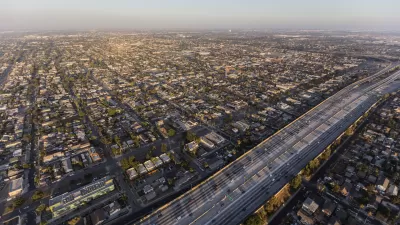After a years-long, tenant-led effort, Louisville will use a new tool to analyze whether a proposed housing development can meet a neighborhood’s housing needs and income levels. If it doesn’t, the city won’t subsidize it.

The city of Louisville will begin using a new algorithmic tool to assess the potential for displacement of proposed housing projects, according to a Shelterforce article. “The tool analyzes whether a given project meets the neighborhood’s housing needs and income levels, ensuring that rents match local incomes. If the development does not meet these standards, then the city cannot subsidize it.”
City officials hope the tool will make development more equitable and ensure that city funding does not contribute to the displacement of long-term residents.
“Initially introduced as the ‘Historically Black Neighborhoods Ordinance,’ the bill was intended to address displacement from Black neighborhoods. But legislators and housing advocates changed the ordinance’s aim so that it could apply to any neighborhood with displacement concerns—and withstand potential legal challenges.”
Advocates hope the tool will also elevate affordable housing projects that need city funding. “The tool relies on Louisville’s own housing needs assessment, released in March 2024, which found that there were no homes affordable to more than half of the city’s lowest-income residents, those making 30 percent of the area median income. But there was an oversupply of homes for someone making 80 to 150 percent of the area median income.”
According to Shelrerforce, “Shelterforce/Next City tested the tool with a hypothetical project in Louisville’s Downtown area where one quarter of the units are affordable to extremely low-income people and half are market rate. The tool said the area already had a high displacement risk: half of residents who live there can only afford rent of around $500 a month. Because of this, the hypothetical building would not qualify for a city subsidy, according to the tool.”
FULL STORY: ‘Anti-Displacement Tool’ to Direct City Funding to Projects that Won’t Price Out Residents

Planetizen Federal Action Tracker
A weekly monitor of how Trump’s orders and actions are impacting planners and planning in America.

Map: Where Senate Republicans Want to Sell Your Public Lands
For public land advocates, the Senate Republicans’ proposal to sell millions of acres of public land in the West is “the biggest fight of their careers.”

Restaurant Patios Were a Pandemic Win — Why Were They so Hard to Keep?
Social distancing requirements and changes in travel patterns prompted cities to pilot new uses for street and sidewalk space. Then it got complicated.

Platform Pilsner: Vancouver Transit Agency Releases... a Beer?
TransLink will receive a portion of every sale of the four-pack.

Toronto Weighs Cheaper Transit, Parking Hikes for Major Events
Special event rates would take effect during large festivals, sports games and concerts to ‘discourage driving, manage congestion and free up space for transit.”

Berlin to Consider Car-Free Zone Larger Than Manhattan
The area bound by the 22-mile Ringbahn would still allow 12 uses of a private automobile per year per person, and several other exemptions.
Urban Design for Planners 1: Software Tools
This six-course series explores essential urban design concepts using open source software and equips planners with the tools they need to participate fully in the urban design process.
Planning for Universal Design
Learn the tools for implementing Universal Design in planning regulations.
Heyer Gruel & Associates PA
JM Goldson LLC
Custer County Colorado
City of Camden Redevelopment Agency
City of Astoria
Transportation Research & Education Center (TREC) at Portland State University
Camden Redevelopment Agency
City of Claremont
Municipality of Princeton (NJ)





























